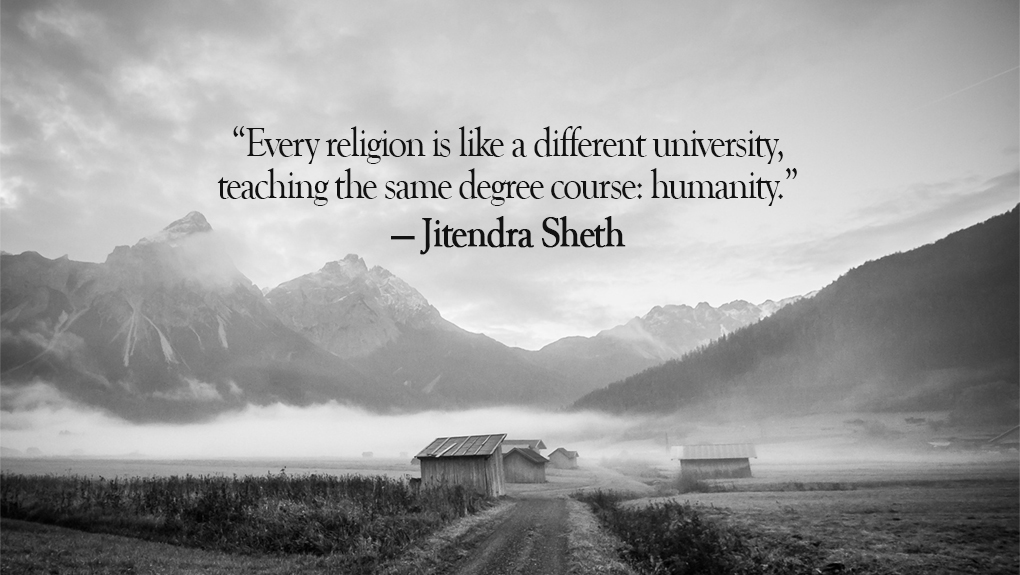|
Getting your Trinity Audio player ready...
|

In reflecting on the essence of diverse religions, it’s clear that each offers a unique perspective on life. Yet, despite their differences, they all guide us toward a singular understanding: the importance of embracing and uplifting our shared humanity. Every belief system, with its distinct traditions and practices, ultimately teaches us about compassion, understanding, and love—qualities that define what it means to be human. This shared lesson transcends beliefs, uniting us in a common purpose.
The world is a tapestry of different cultures, beliefs, and traditions, yet there is a golden thread that connects us all. This thread is our shared humanity. In every corner of the globe, people are taught to be compassionate, to love, and to care for one another. And while these teachings may come in different forms—whether through religion, philosophy, or cultural norms—the message remains the same: humanity is at the core of all we do.
The Power of Religion to Unite and Uplift
Religion has been a cornerstone of human civilization for thousands of years. From the towering pyramids of ancient Egypt to the bustling temples of modern-day India, faith has played a crucial role in shaping the way we live, interact, and view the world. And while each religion has its own unique beliefs and practices, they all share a common goal: to guide their followers toward a deeper understanding of life and a more meaningful existence.
At its core, religion teaches us to be better people. It encourages us to look beyond our differences and see the humanity in others. Whether through acts of kindness, charitable giving, or simply treating others with respect, religion offers a moral framework that promotes unity and compassion.
However, in a world that often seems divided by differences—whether in religion, culture, or politics—it’s easy to forget this shared goal. We often focus on what sets us apart, rather than what brings us together. But when we take a step back and look at the bigger picture, we see that the essence of every religion is the same: to teach us the importance of humanity.
Historical and Cultural Perspectives
Throughout history, this message has been echoed by great thinkers, philosophers, and religious leaders across the world. From the teachings of the Buddha in ancient India to the words of Jesus Christ in the Middle East, the importance of love, compassion, and understanding has been a central theme in religious teachings.
For instance, the concept of Ahimsa, or non-violence, is a cornerstone of both Hinduism and Buddhism. This principle teaches followers to avoid harm to any living being, promoting kindness and compassion in all interactions. Similarly, Islam teaches the value of mercy and charity, encouraging Muslims to give back to their communities and help those in need.
In Christianity, the concept of love for one’s neighbor is a fundamental teaching. The Bible encourages believers to “love your neighbor as yourself,” emphasizing the importance of empathy and understanding in building a harmonious society. Likewise, in Judaism, the idea of Tikkun Olam—or “repairing the world”—is a guiding principle that encourages Jews to take responsibility for the welfare of others and work towards the betterment of humanity.
These teachings may come from different cultures and historical contexts, but they all carry the same message: our shared humanity is what binds us together.
Modern Reflections: The Need for Unity Today
In today’s fast-paced and increasingly interconnected world, this message of unity is more important than ever. We live in a global society where borders are blurred, and cultures are constantly intersecting. Yet, despite this connectivity, we still struggle with division. Whether it’s due to political ideologies, racial differences, or religious beliefs, it’s easy to fall into the trap of “us versus them” thinking.
However, now is the time to break down these barriers and focus on what unites us. The challenges we face—whether they’re global issues like climate change or personal struggles—are best addressed when we come together as a collective. When we embrace the idea that we are all part of the same human family, we unlock the potential to create positive change.
Consider the ongoing efforts to tackle the climate crisis. Activists from all walks of life—different nationalities, religions, and cultures—are banding together to raise awareness and push for action. This is humanity at its best: working together for a common cause, despite differences.
Another example is the global response to the COVID-19 pandemic. Around the world, individuals, communities, and nations have come together to support one another in times of need. Healthcare workers, volunteers, and everyday people have shown extraordinary compassion in helping those affected by the virus. The pandemic has reminded us of our shared vulnerability, but it has also highlighted our capacity for kindness, empathy, and solidarity.
Personal Stories and Reflections
Reflecting on this shared humanity, I’ve seen firsthand how understanding and embracing our common purpose makes a difference. Whether through personal interactions or broader community engagements, the power of empathy and compassion is undeniable.
One such story comes from a close friend of mine who practices Buddhism. She often speaks of the principle of Metta, or loving-kindness, which is a core teaching in her faith. This principle encourages her to extend compassion not only to those she loves but to all beings—strangers, and even those with whom she disagrees. Over the years, I’ve watched as she navigates difficult situations with a calm and open heart, always seeking to understand rather than judge.
Another story comes from a colleague who is deeply involved in his local church. He speaks of the importance of service and community in his faith and how these values have shaped his life. From organizing food drives to volunteering at shelters, he embodies the spirit of compassion and generosity. His faith reminds him that we are all connected, and that by helping others, we help ourselves.
These stories, and countless others like them, illustrate the profound impact that a focus on shared humanity can have. When we look beyond our differences and recognize the common threads that bind us, we open ourselves up to deeper connections and a more meaningful life.
The Role of Empathy in Building a Better World
Empathy is at the heart of this shared humanity. It is the ability to understand and share the feelings of others, and it’s a quality that can bridge divides and foster deeper connections. Whether in our personal relationships, professional environments, or global interactions, empathy allows us to see beyond the surface and truly understand one another.
In a world that often feels divided, practicing empathy can be transformative. When we take the time to listen to others’ perspectives and put ourselves in their shoes, we can find common ground, even in the most challenging situations. Empathy not only strengthens relationships but also builds communities that are more inclusive, supportive, and resilient.
The workplace is a powerful example of where empathy can thrive. As organizations become more diverse, leaders are increasingly recognizing the importance of fostering an empathetic culture. Teams that embrace empathy are more collaborative, creative, and productive. When people feel seen, heard, and valued, they are more motivated to contribute and succeed.
Empathy also plays a crucial role in leadership. The most effective leaders are those who lead with compassion and understanding. They take the time to understand the needs and concerns of their team members, and in doing so, create environments where everyone can thrive. By leading with empathy, we not only build stronger teams but also create a ripple effect that extends beyond the workplace.
A Call to Embrace Our Shared Humanity
In the grand scheme of things, our differences are what make the world a vibrant and diverse place. But at the core, we are all connected by the same fundamental truth: we are human, and we share a responsibility to treat each other with kindness, respect, and compassion.
As we move forward in life—whether in our personal journeys, professional endeavors, or societal roles—let’s keep this universal lesson in mind. No matter our faith, culture, or background, we are all here to learn the same thing: how to be better humans. By embracing this truth, we can break down the barriers that divide us and build a world that thrives on unity, empathy, and love.
So, I invite you to reflect on how this lesson of humanity plays out in your own life. How can you show more compassion? How can you help uplift others, regardless of their background or beliefs? It’s in these small, everyday actions that we can truly make a difference.
Together, we have the power to shape a more compassionate and inclusive world—one where our shared humanity shines brighter than any division.
As Jitendra Sheth aptly puts it, “Every religion is like a different university, teaching the same degree course: humanity.”

